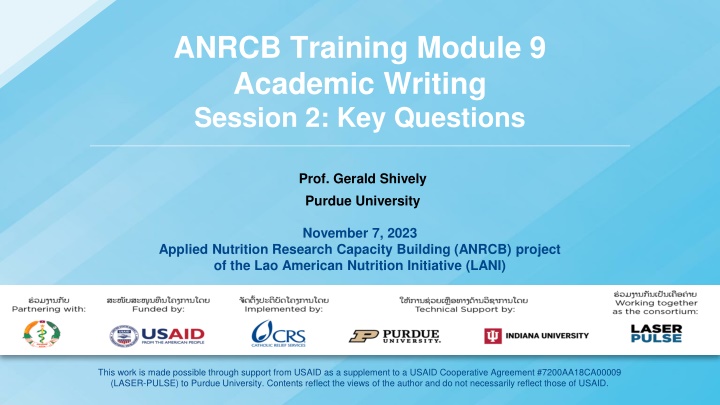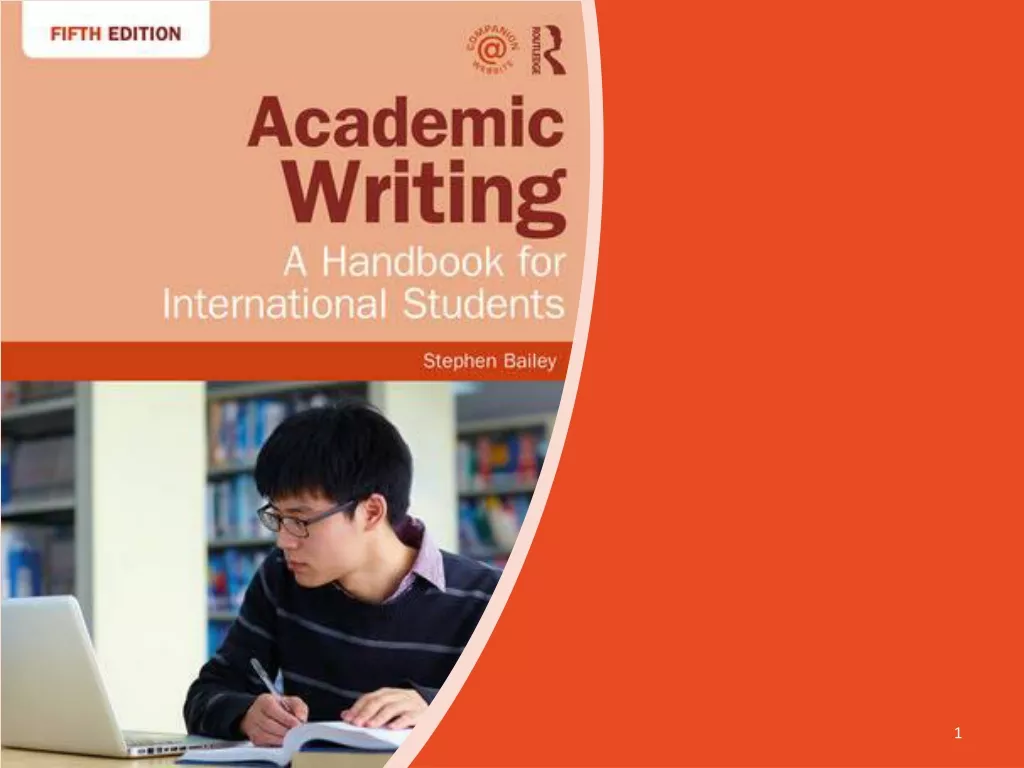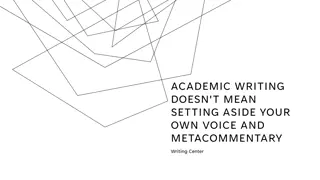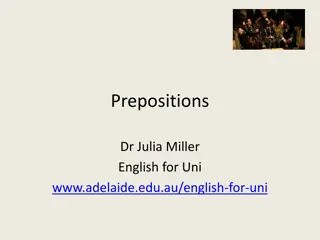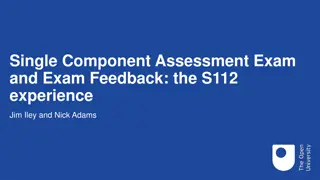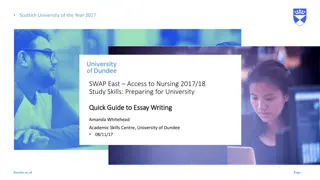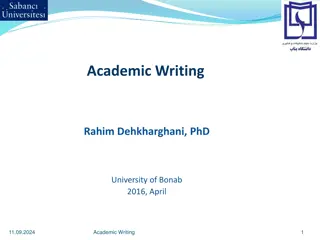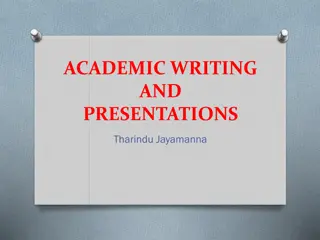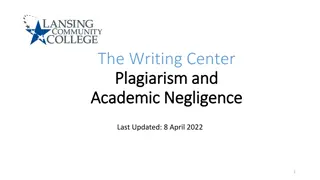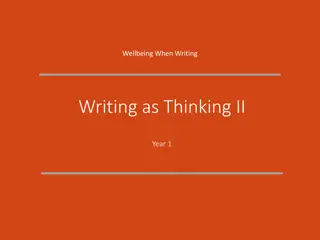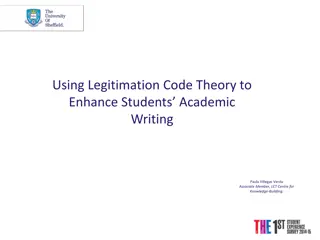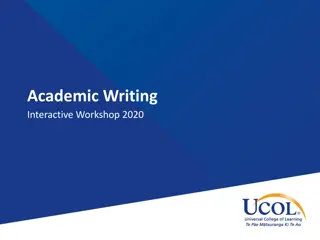ANRCB Training Module 9 Academic Writing
This session focuses on key questions related to academic writing as presented by Professor Gerald Shively from Purdue University. Explore essential insights and guidance on academic writing practices and strategies in a scholarly context.
Download Presentation

Please find below an Image/Link to download the presentation.
The content on the website is provided AS IS for your information and personal use only. It may not be sold, licensed, or shared on other websites without obtaining consent from the author.If you encounter any issues during the download, it is possible that the publisher has removed the file from their server.
You are allowed to download the files provided on this website for personal or commercial use, subject to the condition that they are used lawfully. All files are the property of their respective owners.
The content on the website is provided AS IS for your information and personal use only. It may not be sold, licensed, or shared on other websites without obtaining consent from the author.
E N D
Presentation Transcript
ANRCB Training Module 9 Academic Writing Session 2: Key Questions Prof. Gerald Shively Purdue University November 7, 2023 Applied Nutrition Research Capacity Building (ANRCB) project of the Lao American Nutrition Initiative (LANI) This work is made possible through support from USAID as a supplement to a USAID Cooperative Agreement #7200AA18CA00009 (LASER-PULSE) to Purdue University. Contents reflect the views of the author and do not necessarily reflect those of USAID.
Five key questions every paper must answer 1. What is the problem? 2. Why is it important? 3. How did you study it? 4. What did you find? 5. Who should care? Introduction Literature Review Methods Results Discussion/conclusions ANRCB | 3
What is the problem? Could be any of the following: Problem statement Research question Hypothesis The important thing is to clearly identify the issue the paper is about. ANRCB | 4
Why is it important? You must convince the reader to care about the paper: Policy concern Misunderstanding of issue Local or global crisis Gap in knowledge The importance and the gap in knowledge is typically established through a review of previous findings on the subject. ANRCB | 5
How did you study it? The methods of the paper must be crystal clear. Anyone following the same procedure using the same dataset should be able to arrive at the same conclusion. Should include such things as: Sampling method Sample size and domain (temporal and spatial representation) Statistical techniques employed ANRCB | 6
What did you learn? State the findings in an objective manner Provide information about statistical significance (or not) ANRCB | 7
Who should care? Why is what you learned important? Who should be interested in the findings? Other researchers? Policy makers? Practitioners? ANRCB | 8
Abstracts A good abstract answers the following questions: What is the main research problem/question? (introduction) How is it studied in the paper? (data and methods) What did you find? (results) ABSTRACT. This paper studies how A and B are related. Data from N children collected in year Y in location L are used. Model M is used to measure X and Y. The main conclusion is E, which suggests F increases by 1 standard deviation in response to a P percentage point change in G. Note that you should always consult the style sheet for the journal that you are submitting to. For most research papers a 100-150 word abstract is sufficient. Simply state what the paper is about, the data and methods used, and the main findings. 9
Key words Always include 3-5 key words Reason: used for indexes and searches It is not necessary to duplicate words that appear in the title Location/region Sample population Independent variables Dependent variables Relevant policies or programs 10
Titles Why does a good title matter? It communicates and sends a signal to the editor and reviewers Eventually it will attract potential readers What makes a good title? Informative As short as possible, but long enough to convey the contents of the paper Specific is better than general Free from errors in grammar Free from typographical errors Avoid using duplicate words 11
Exercise Choose the better title from the following pairs and discuss your reasoning. Version A Version B Reason Agricultural Diversity and Child Stunting in Nepal Diversity of Agricultural and Stunting of Childs: in Nepal Studying the expenses of nutritious diets in the African country of Uganda for ten years Charting the cost of nutritionally-adequate diets in Uganda, 2000-2011 Implications of Food-for-Work Programs for Diet and Production Diversity in Ethiopia Implications of Food-for-Work Programs in Ethiopia for Diets in Ethiopia and Production Diversity in Ethiopia Is Effective Nutrition Governance Correlated with Better Nutrition Outcomes in Nepal? Effective Nutrition Governance is Correlated with Better Nutrition Outcomes in Nepal The informal food environment in Tanzania: why and how does it matter? Informal food environment is associated with household vegetable purchase patterns and dietary intake in the DECIDE study: Empirical evidence from food vendor mapping in peri-urban Dar es Salaam, Tanzania Excess calorie availability and adult BMI: a cohort analysis of patterns and trends for 156 countries from 1890 to 2015 Calories and BMI Profitability of organic production in Northwest Vietnam Profitability of organic vegetable production in Northwest Vietnam: Evidence from Tan Lac District, Hoa Binh Province 12
